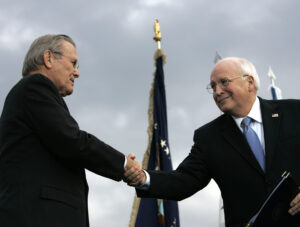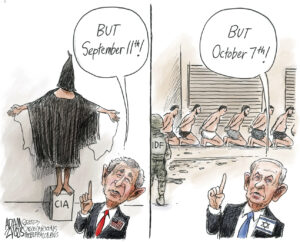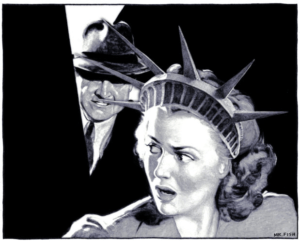Journalism Icon I.F. Stone’s Words Ring Truer Than Ever in ‘All Governments Lie’
The documentary makes a strong case, with input from a starring lineup of left-leaning investigative reporters, in support of a theme that keeps repeating.
The late investigative journalist I.F. Stone, publisher of I.F. Stone’s Weekly, gets to work at his Washington home in this 1966 photo. (William J. Smith / AP)
“All governments lie,” said legendary journalist I.F. Stone, who dedicated his career to uncovering those lies in I.F. Stone’s Weekly, a prototypical print blog he ran out of his house for close to 20 years. His famous maxim is the title of an incisive critique of mainstream media in theaters now—“All Governments Lie: Truth, Deception, and the Spirit of I.F. Stone,” directed by Fred Peabody and executive-produced by Oliver Stone.
A legendary political writer for the New York Post and The Nation during the 1930s and ’40s, Isidor Feinstein Stone (Izzy) was blacklisted in 1950 but would not be muzzled. Beginning with a readership of 5,000, including Marilyn Monroe and Albert Einstein, I.F. Stone’s Weekly had amassed more than 70,000 readers when he discontinued it in 1971. It was cited number 16 in “The Top 100 Works of Journalism in the United States in the 20th Century.”
While the movie’s title may sound a bit cynical, Peabody makes his case in the opening seconds with a montage of government whoppers—Lyndon Johnson dreaming up the Gulf of Tonkin incident as a pretense for aggression in Vietnam; Nixon telling the media, “I am not a crook”; Colin Powell ringing the alarm over “yellow cake” in Baghdad; and Donald Trump saying, well, just about anything.
It transitions smoothly to Matt Taibbi on the campaign trail covering the GOP candidate in New Hampshire for Rolling Stone magazine. Few would question Taibbi’s bona fides, considering his muckraking work on Goldman Sachs and the 2008 election before that, but even fewer would consider Rolling Stone outside the mainstream.
While that publication lands left of center on the spectrum, it can hardly be called a “haven for dissent.” That’s how Democracy Now! host and executive producer Amy Goodman describes the role of media, but she worries that corporate money has co-opted mainstream voices.
The mainstream is targeted by many who credit it in some part with the rise of Trump and other transgressions, such as beating the drum for war in Iraq. “The biggest crime since World War II,” Ralph Nader calls the U.S. invasion, adding, “with mainstream media complicity.”
As if to confirm Goodman’s fears, CBS chief Les Moonves is caught saying of Trump, “It may not be good for America, but it’s damn good for CBS” at the Morgan Stanley Technology, Media & Telecom Conference earlier this year. “I’ve never seen anything like this, and this is going to be a very good year for us. Sorry. It’s a terrible thing to say. But bring it on, Donald. Keep going.”
In 2014, Jeremy Scahill formed The Intercept with Glenn Greenwald, formerly of The Guardian, and documentary filmmaker Laura Poitras (“Citizenfour”), who resigned in September. The Intercept initiative was underwritten by a $250 million endowment from eBay founder Pierre Omidyar.
“If we don’t get to the heart of the matter, that there was, long ago, a coup in this country, a silent coup where corporations took total control of the process of selecting leaders in this country, then nothing’s going to change,” warns Scahill, who began his journalism career as a Democracy Now! intern. “The coup has already happened, and none of these people seem to realize it.”
More dire assessments come from former New York Times journalist and current Truthdig columnist Chris Hedges, who tells us, “Those reporters who care more about the truth will eventually become management problems.” On this point, “All Governments Lie” begins to get fuzzy.
Is Taibbi a management problem for Wenner Media, which owns Rolling Stone, Us Weekly and Men’s Journal? And what will it take for MSNBC to start having second thoughts about David Corn, also in the movie, who broke the news of Mitt Romney’s 47 percent video for Mother Jones and is a regular guest on the news network’s evening show, “The Last Word with Lawrence O’Donnell”? How long before the same bosses tell him to comport himself “more like a senator,” as “The Young Turks” anchor Cenk Uygur recalls in the film about the lead-up to his own departure from that network?
What about omissions, including WikiLeaks, a virtual pariah among some on the left in this election cycle? Although the famous 2010 “Collateral Murder” video provided by Chelsea Manning gets an airing, neither she nor WikiLeaks founder Julian Assange rates a mention. Neither does Seymour Hersh, who broke the Abu Ghraib story for The New Yorker. When his later account of the Osama bin Laden takedown didn’t match the official story, no U.S. outlet would publish it; it ran in “The London Review of Books” instead.
While all the journalists included in the movie are independent-minded, they don’t necessarily fit the film’s central conflict—independent versus mainstream voices. Not to suggest that each of these reputable scribes is stifled by corporate overlords, but a more appropriate binding principle for the film might have been the dire need for unfettered investigative journalism.
Goodman says good journalism has the state in its crosshairs. It may sound like a battle cry, but Izzy Stone would call it a cry for peace. “Every idea subverts the old to make way for the new,” he wrote in 1954. “To shut off subversion is to shut off peaceful progress and to invite revolution and war.”
With an uncertain future and a new administration casting doubt on press freedoms, the danger is clear: The truth is at risk.
Now is the time to give. Your tax-deductible support allows us to dig deeper, delivering fearless investigative reporting and analysis that exposes what’s really happening — without compromise.
Stand with our courageous journalists. Donate today to protect a free press, uphold democracy and unearth untold stories.






You need to be a supporter to comment.
There are currently no responses to this article.
Be the first to respond.